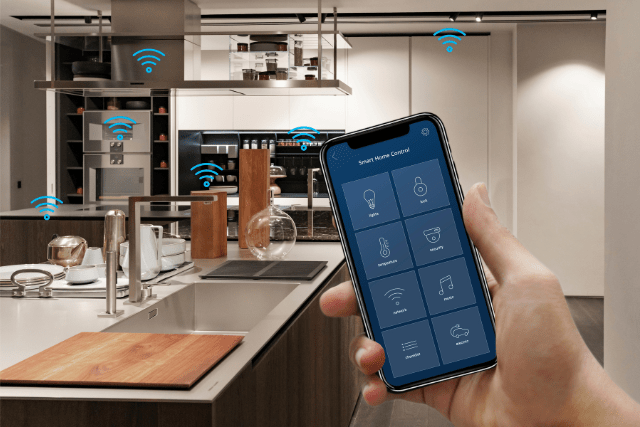Smart home technology refers to using interconnected devices and systems that allow individuals to control and monitor various aspects of their home, including appliances, lighting, heating and cooling, security, and entertainment, remotely through a central hub or a smartphone tablet app.
Smart home technology in modern kitchen appliances
Modern kitchen appliances have come a long way in recent years, with many now featuring advanced features and technologies that make cooking, cleaning, and other household tasks more accessible and efficient.
Some examples of modern kitchen appliances include smart refrigerators, ovens, dishwashers, coffee makers, and kitchen assistants.
The role of smart home technology in modern kitchen appliances is to enhance the functionality and convenience of these appliances. With smart home technology, individuals can remotely control and monitor their kitchen appliances, receive alerts when specific tasks are completed, and access various helpful features and functions.
Smart home technology also allows for greater integration and connectivity between different kitchen appliances, making it easier for individuals to manage and coordinate household tasks.
The benefits of remotely controlling kitchen appliances
Smart kitchen appliances often have various features that can help us save energy and reduce our carbon footprint.
For example, smart ovens may have features that allow us to turn off the oven when it is not in use or to reduce the cooking time for certain items.
Smart refrigerators may have features that allow us to monitor and control the temperature and humidity levels to ensure that our food stays fresh for longer.
There are numerous benefits to using smart home technology in modern kitchen appliances. Some of the benefits include:
- Convenience: With smart home technology, individuals can control and monitor their kitchen appliances from anywhere, anytime, using their smartphone or tablet. This means that individuals can start or stop an appliance, check its status, or receive alerts when certain tasks are completed, all from the comfort of their homes or on the go.
- Efficiency: Smart kitchen appliances often have features that help to optimize their performance and save energy. For example, a smart refrigerator may have a built-in energy-monitoring system that helps individuals to save on their energy bills. In contrast, a smart oven may have a temperature sensor that ensures that food is cooked to perfection every time.
- Integration: Smart home technology allows for greater connectivity and integration between different kitchen appliances. Individuals can coordinate and manage their household tasks more easily and efficiently, as they can access and control their appliances from a single hub or app.

Connectivity and integration
One of the key benefits of smart home technology in modern kitchen appliances is the ability to connect and integrate different appliances.
Individuals can coordinate and manage their household tasks more efficiently by accessing and controlling their appliances from a single hub or app.
For example, they can set their smart oven to start cooking dinner at a certain time, while their smart dishwasher can be set to start its cycle after dinner is finished.
Individuals can receive alerts when certain tasks are completed, such as when the dishwasher has finished its cycle or when the coffee maker has finished brewing.
Smart home technology also allows for greater integration with other smart home devices, such as smart thermostats and smart lighting systems. This means that individuals can use their smart kitchen appliances to control and monitor other aspects of their homes, creating a more cohesive and efficient smart home ecosystem.
Smart refrigerators are equipped with smart home technology, allowing them to be controlled and monitored remotely through a central hub or smartphone app. These refrigerators offer a range of advanced features and functions that make managing and organizing food easier and more efficient.

Examples of smart kitchen appliances
Some examples of smart kitchen appliances include:
- Smart refrigerators: These refrigerators are equipped with smart home technology that allows individuals to control and monitor their fridges remotely, as well as access a variety of features such as a built-in energy-monitoring system, temperature sensors, and alerts when food is about to expire. e.g. checkout Panasonic 592 L Wifi Inverter Frost-Free Side by Side Refrigerator
- Smart ovens: Smart ovens have smart features such as temperature sensors, automatic shut-off, and the ability to be controlled and monitored remotely through a smartphone app.
- Smart dishwashers: These dishwashers have features such as remote control, automatic shut-off, and the ability to send alerts when the dishwasher has finished its cycle.
- Smart coffee makers: These coffee makers have features such as the ability to be controlled and monitored remotely, automatic shut-off, and the ability to schedule coffee brewing times.
Smart kitchen assistants: These assistants, such as the Amazon Echo Show, have voice-activated commands and the ability to connect to a range of smart kitchen appliances, allowing individuals to control and monitor their appliances through voice commands.
Challenges of Smart home technology in modern kitchen appliances
While smart home technology has brought numerous benefits to the way we use modern kitchen appliances, it is not without its challenges. Some of the main challenges of smart home technology in the kitchen include:
Cost: Smart kitchen appliances can be more expensive than traditional ones, which may deter some consumers. While the long-term cost savings from energy efficiency and other features may offset the initial investment, it may still be a barrier for some.
Dependence on technology: Smart kitchen appliances rely on internet connectivity and software updates to function properly. If there are issues with the internet connection or the software is not updated, the appliances may not work as intended.
Security concerns: Internet-connected devices, including smart kitchen appliances, can potentially be vulnerable to hacking and cyber-attacks. This raises concerns about the security of our personal information and the safety of our homes.
Compatibility issues: Smart kitchen appliances may not always be compatible with other smart home devices or systems, which can be frustrating for consumers trying to integrate them into their existing setup.
Limited availability: While the market for smart kitchen appliances is growing, they are not as widely available as traditional ones. This can make it difficult for consumers to find and purchase the specific smart appliances they are interested in.
Solutions to the above challenges
Several potential solutions can be implemented to address the challenges of smart home technology in modern kitchen appliances.
Offer financing options: To make smart kitchen appliances more accessible to consumers, manufacturers and retailers could offer financing options or payment plans to make the initial investment more manageable.
Invest in robust internet infrastructure: Ensuring a strong and reliable internet connection can help minimize connectivity issues and software updates.
Implement robust security measures: Manufacturers and retailers can work to implement robust security measures to protect against hacking and cyber-attacks. This could include encryption, secure software updates, and two-factor authentication.
Enhance compatibility: Manufacturers can work to improve the compatibility of their smart kitchen appliances with other smart home devices and systems to make it easier for consumers to integrate them into their existing setup.
Increase availability: Manufacturers and retailers can work to increase the availability of smart kitchen appliances by expanding distribution channels and making them more widely available in stores and online.
| Challenge | Solution |
|---|---|
| Cost | Offer financing options or payment plans |
| Dependence on technology | Invest in robust internet infrastructure |
| Security concerns | Implement robust security measures |
| Compatibility issues | Enhance compatibility with other smart home devices and systems |
| Limited availability | Increase availability through expanded distribution channels |
Conclusion
The role of smart home technology in modern kitchen appliances is to enhance the functionality and convenience of these appliances. With smart home technology, individuals can remotely control and monitor their kitchen appliances, receive alerts when specific tasks are completed, and access various helpful features and functions.
Smart home technology also allows for greater integration and connectivity between different kitchen appliances, making it easier for individuals to manage and coordinate household tasks.
There are many examples of smart kitchen appliances, including smart refrigerators, ovens, dishwashers, coffee makers, and kitchen assistants, each with unique features and functions.
Smart home technology plays a crucial role in the functionality and convenience of these appliances, and its integration is becoming increasingly important as more and more individuals adopt smart home technology in their homes.
In the future, we will likely see even more developments in smart home technology and kitchen appliances. Some potential developments include the integration of artificial intelligence and voice control in smart kitchen appliances and the development of more advanced features and functions that further enhance the efficiency and convenience of these appliances.
Overall, integrating smart home technology in modern kitchen appliances is an important step towards creating a more efficient and convenient household.
Leveraging the power of smart home technology, individuals can better manage and coordinate their household tasks, saving time and effort and creating a more seamless and enjoyable home experience.






